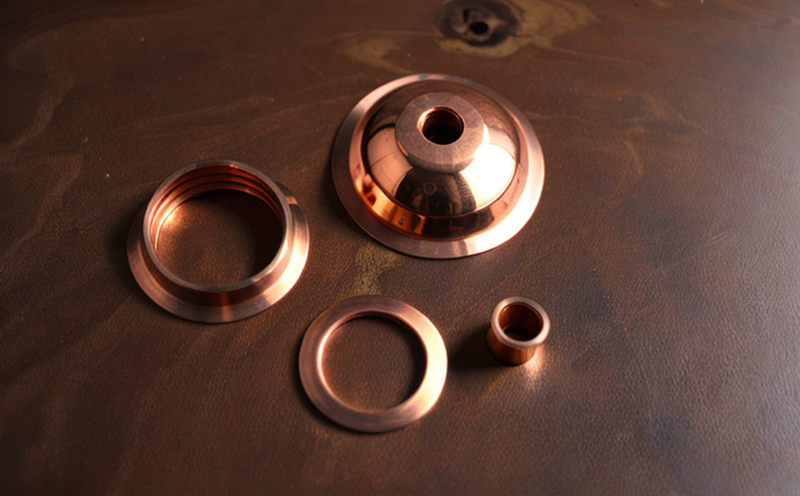SAE ARP 1876 Thermal Shock Environmental Testing
The SAE ARP 1876 standard is a critical guideline for testing materials used in aerospace and aviation applications to ensure they can withstand extreme thermal shock environments. This service focuses on evaluating copper and brass materials, which are widely used due to their excellent electrical conductivity, corrosion resistance, and mechanical properties.
Thermal shock is a significant challenge faced by components operating in the harsh conditions of aerospace and aviation systems. These environments often involve rapid temperature changes that can lead to material fatigue or failure. The SAE ARP 1876 testing procedure simulates these conditions using controlled thermal cycling, which subjects materials to rapid heating and cooling cycles.
The process begins with careful preparation of the copper and brass samples. Each sample must be representative of the intended aerospace component, ensuring that any flaws are not introduced during handling or testing. The test setup typically includes a chamber capable of precise temperature control, often using water baths for rapid temperature changes. The test procedure involves cycling the samples between two specified temperatures, such as -50°C and 125°C, at a rate that mimics real-world conditions.
During testing, critical parameters are monitored to ensure compliance with SAE ARP 1876 standards. These include temperature control accuracy, cycle time duration, and the number of cycles required for each test run. The testing environment must be meticulously controlled to replicate the thermal stress experienced by materials in operational aerospace systems.
The results from this testing are crucial for quality managers and compliance officers, as they provide definitive evidence of a material's durability and reliability under extreme conditions. For R&D engineers, these tests offer valuable insights into how different alloy compositions or processing methods affect performance. Procurement teams can use the test outcomes to select materials that meet stringent aerospace requirements.
The SAE ARP 1876 standard is particularly important for ensuring the integrity of copper and brass components in critical systems such as avionics, fuel lines, and structural parts. By adhering to this testing procedure, manufacturers can ensure their products are not only compliant with regulatory standards but also reliable under real-world conditions.
Thermal shock testing helps identify potential weaknesses early in the development process, allowing for improvements before costly failures occur in operational environments. This proactive approach is essential for maintaining safety and performance standards in aerospace and aviation applications.
Applied Standards
- SAE ARP 1876: Standard Guide for Thermal Shock Environmental Testing of Copper and Brass Materials in Aerospace Applications
- ISO/IEC 17025: Requirements for the Competence of Testing and Calibration Laboratories
- ASTM E340: Practice for Determining Resistance to Sudden Temperature Changes (Thermal Shock) Using Small-Size Specimens
The SAE ARP 1876 standard is integral to ensuring that copper and brass materials used in aerospace applications can withstand the rigors of thermal shock. This standard specifies the test methods, specimen preparation procedures, and acceptance criteria necessary for accurate testing.
ISO/IEC 17025 ensures that laboratories conducting these tests are competent and adhere to strict quality management systems. ASTM E340 provides additional guidance on testing techniques, particularly focusing on small specimens which are often used in aerospace applications due to space constraints.
Eurolab Advantages
At Eurolab, we pride ourselves on offering comprehensive and accurate SAE ARP 1876 thermal shock environmental testing. Our advanced facilities and experienced personnel ensure that every test meets the highest standards of accuracy and reliability.
We use state-of-the-art equipment to control temperature with precision, ensuring that each cycle accurately replicates real-world conditions. Our team of experts is well-versed in SAE ARP 1876 guidelines, allowing us to provide detailed reports that are both compliant and informative.
Our commitment to quality extends beyond just meeting standards; we also offer tailored testing services to meet specific client requirements. Whether you need routine compliance testing or specialized studies, Eurolab is equipped to deliver the results you need.
We ensure a seamless testing process from sample preparation through reporting. Our clients receive comprehensive reports that include detailed test data and recommendations for improvement where necessary. This level of service ensures that our customers are fully informed about their material's performance under thermal shock conditions.
Use Cases and Application Examples
- Aircraft Engines: Testing copper and brass components in aircraft engines to ensure they can withstand extreme temperature changes during startup, operation, and shutdown processes.
- Fuel Lines: Evaluating the durability of fuel lines to prevent leaks under rapid temperature fluctuations.
- Avionics Systems: Assessing the reliability of avionic components that must function consistently in varying thermal environments.
- Aircraft Structures: Ensuring structural integrity of copper and brass parts by testing their resistance to thermal shock during manufacturing and operational phases.
The SAE ARP 1876 standard is particularly relevant for these applications because it provides a standardized approach to evaluating materials that are critical to the safe and efficient operation of aerospace systems. By adhering to this standard, manufacturers can ensure their products meet the stringent requirements set by regulatory bodies.





